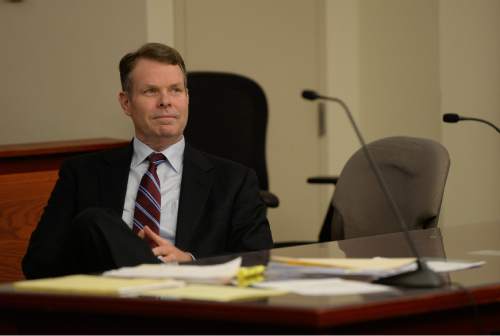This is an archived article that was published on sltrib.com in 2016, and information in the article may be outdated. It is provided only for personal research purposes and may not be reprinted.
A state judge will not force Salt Lake County prosecutors to pursue a cache of evidence gathered by the FBI in a multiyear investigation of former Utah Attorney General John Swallow.
In a ruling issued Tuesday, 3rd District Judge Elizabeth Hruby-Mills said she found no grounds for issuing a "motion to compel" because she had no evidence to suggest the Salt Lake County district attorney's office had failed to pursue or turn over any relevant evidence, including anything that might exonerate Swallow.
A message seeking comment from Swallow's attorney, Scott C. Williams, was not immediately returned Tuesday night.
On Wednesday, Swallow's attorney, Scott C. Williams said the judge's denial was not surprising, not did it cause him immediate concern. Hruby-Mills, he said, only concluded that there is not yet proof of a problem.
"All the judge did say was 'I'll be here, when the thing things that you think are going to happen, do happen," Williams said. "It also continues shows how the different treatment of the cases between the Salt Lake County District Attorney (SLCDA) and Davis County Attorney Troy Rawlings could lead to a different applications of due process."
Swallow, 53, has pleaded not guilty to 14 felony and misdemeanor charges, including counts of money laundering, misuse of public funds, obstruction of justice and falsifying government records.
The charges stem from allegations of bribery and public corruption inside the attorney general's office and extend to Swallow and his predecessor, Mark Shurtleff, who also has pleaded not guilty to criminal charges. Swallow and Shurtleff were initially charged as co-defendants, but the cases were later separated.
Both men, who face up to 30 years in prison if convicted, were investigated by the FBI and state police. In Shurtleff's case, Rawlings has vigorously pursued the material, which court papers suggest is held in multiple terabytes of digital files.
Rawlings says the data are critical to his investigation and prosecution of Shurtleff, and he had asked the court for a similar order from Hruby-Mills.
In February, however, he told the judge an order might not be needed because the FBI and the Department of Justice had started to provide him additional materials.
Salt Lake County prosecutors had not sought the additional data from federal agencies, and they have said they didn't believe that information was necessary for their case.
Williams disagrees, but he was unable to convince Hruby-Mills that he should have more than just a promise that the evidence provided to Rawlings in the Shurtleff matter will be shared with him — although nothing suggests that it either cannot or would not be, the judge noted.
As the judge noted, Swallow has acknowledged that he has received — and expects to continue to receive — additional evidence and has failed to prove that the Salt Lake County district attorney has not provided any of the materials in its possession.
"Defendant seeks the order to compel at least in part on the supposition that the federal government's release of the material to Mr. Rawlings and Mr. Shurtleff may be under a protective order limiting dissemination," she wrote, adding that the court can't act based on "factual suppositions."
The judge also said courts generally allow prosecutors broad discretion to determine the manner in which they prosecute defendants, and that she can find "no basis to review, or substitute" that discretion with the preferences of Swallow or the court.
@jenniferdobner



